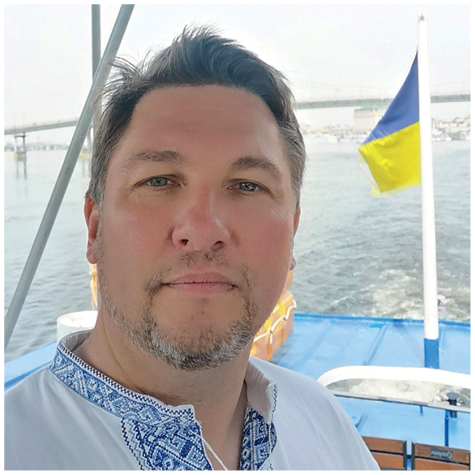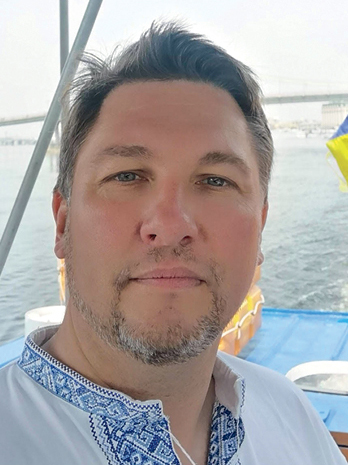Quick Links
Search
Personal Record
- Volume 42 | Issue 2 | February 2024
Pursuing geoscience in time of war

As war enters third year, Dmitry Bozhezha continues to provide EAGE’s service point in Kyiv, Ukraine, running a busy events and membership programme. In his academic and industry career dedicated to innovation, he is currently R&D director, Geoprom, a small research company pioneering geoelectric prospecting technology.
Upbringing in Kyiv
My childhood is vividly imprinted with memories of accompanying my mother, a hydrogeologist, on field work during the summers. Starting from the age of four, I found myself exploring the mountain rivers of the Carpathians, the vast steppe regions of the Donbas, and the picturesque Crimean Peninsula. These early adventures left an indelible mark on my life. However, this period was not without its challenges, occurring during the Soviet occupation of Ukraine and the disastrous Chernobyl accident.
Student/early career
At 15, I officially began my professional journey at the hydrogeological laboratory of the National Academy of Sciences of Ukraine. Already intrigued by the evolution of personal computers, I eagerly embraced their application in scientific research throughout my studies which I completed at the Institute of Geological Science National Academy of Ukraine.
My focus initially revolved around the development of unconventional atmogeochemical methods for hydrocarbon prospecting. Subsequently, my research expanded to include innovative geoelectric methods. To date, I am proud to have published over 200 papers, contributing significantly to the advancement of these methodologies and their applications.
Current job at Geoprom
As R&D director at Geoprom, I am involved in harnessing our collective knowledge and expertise to pioneer innovative, cost-effective geoelectric research technology, addressing challenges in the prospecting of hydrocarbon, mineral, and water resources. Our approach is distinctive for its swift problem-solving capabilities, result reliability, and cost-effectiveness compared to traditional methods. We have successfully executed over 400 projects, in Ukraine and internationally,
Everyday life in Kyiv
In the early days of the war, our city lay deserted as numerous residents, including my wife and daughters left for Poland. My mother and I stayed in the western part of the Ukraine. Following our victorious reclaiming of Kyiv, the enemy has retreated, and many people have returned. We strive to maintain a semblance of normality in our lives. However, during air attacks, life comes to a standstill. Residents seek refuge in shelters, The impact of enemy bombardments is evident in the destruction, loss of life, and suffering that every resident of Kyiv has witnessed first-hand.
From my window, I witnessed the aftermath of an attack drone just 200 metres from my home. Eleven flats were damaged serving as a stark reminder of the proximity of danger. From our shelters, we hear the reverberations of hundreds of explosions in various parts of the city.
How EAGE relationship began
In 2007, I took the significant step of becoming a member of EAGE and had the opportunity to attend my first international event. The EAGE Annual Conference and Exhibition held in London. The scale and impact of this meeting left a lasting impression on me.
Back in Kyiv, I volunteered with the EAGE Kyiv Local Chapter and was instrumental in organising the Ukrainian conference on Geoinformatics, over the years incorporating European standards. In 2011, a memorandum was signed between EAGE and AUAG to collaboratively organise the Geoinformatics conference. This partnership significantly elevated the conference’s profile, attracting a substantial number of international participants.
Achievements with EAGE
Since joining the EAGE team in 2010, my commitment to promoting Ukrainian events has taken on a new dimension. There are now four events in Ukraine, in addition to Geoinformatics, the Monitoring Conference, the Geoterrace Young Scientists Conference, and a workshop on landslides. Unlike other conferences in the post-Soviet space, these events are now in English only, which increases the audience and reputation.
Since the outbreak of the war, we have continued to organise these events online, and have made participation not only in these conferences but also in all EAGE events free of charge for all Ukrainians. Also, an EAGE programme of support for scientists from Ukraine has been launched.
Optimistic about future?
I remain optimistic about a swift resolution to the ongoing conflict, anticipating a return to stability. With the restoration of peace, I foresee a growing interest in my country, Ukraine, not only in terms of scientific research but also in the realm of international conferences. Before the war, my daughter accompanied me to some field work from the age of six, as I did in my childhood, so I want to continue this tradition until she grows up. And that requires peace.
